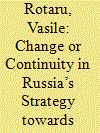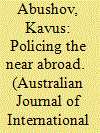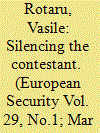| Srl | Item |
| 1 |
ID:
188171


|
|
|
|
|
| Summary/Abstract |
The 2008 invasion of Georgia, followed by the recognition of the independence of the breakaway regions of Abkhazia and South Ossetia, the annexation of Crimea and the involvement in the war in Donbas, and the 2022 invasion of Ukraine have all marked the return to active Russian participation in separatist regions in the ‘near abroad’. They took the international community by surprise. To be sure, the Russian Federation had played a role in all previous secessionist conflicts in the former Soviet space. Nonetheless, Moscow’s post-2008 bold actions – open invasion, recognition of separatist regions and annexation of a neighbour’s territory – have marked an innovation in Russia’s foreign policy. This points to questions about how Moscow is legitimising these actions and whether the official narrative suggests a change in Russia’s strategy towards secessionist conflicts in the ‘near abroad’.
|
|
|
|
|
|
|
|
|
|
|
|
|
|
|
|
| 2 |
ID:
162499


|
|
|
|
|
| Summary/Abstract |
Since the EU has expanded its common security focus in the 1990s, this important regional organisation has become the most frequent mediator in low-level civil conflicts worldwide. Under what conditions is the European Union (EU) likely to become involved in mediation in civil conflicts? Is the participation in mediation only explained by the EU's bias toward its near abroad, or is the EU more strategic? Some scholars have suggested that the EU's regional bias for its near abroad is the key explanation for the onset of EU mediation, but we propose that the reality of EU mediation presents a more nuanced story. We posit three explanations based on mediator bias: regional bias, economic bias, and normative bias. Overall, we argue that the EU will mediate in civil conflicts that are in its near abroad, but also where the EU has economic bias and where the EU can exercise its normative power in highly intractable conflicts. We test our hypotheses using statistical analysis of the UCDP low-level civil conflicts data from 1993 to 2004 and Civil War Mediation data from 1974 to 2005. We find strong support for our hypotheses, determining key factors that reveal the EU's strategic onset of mediation.
|
|
|
|
|
|
|
|
|
|
|
|
|
|
|
|
| 3 |
ID:
088728


|
|
|
|
|
| Publication |
2009.
|
| Summary/Abstract |
This article tries to understand Russia's policies towards the South Caucasus and answer the question of whether there is a tension between Russia's interests and policies. An attempt is made to identify Russia's strategic interests in the region and the crucial factors that shape Russian policies. Based on the assumption that today's Russia gives de facto support to the secessionist regimes in Georgia, the author attempts to explain what the Kremlin's motives are in supporting the secessionist regimes. The author investigates whether Russian support for the separatist regimes in the South Caucasus is a reaction to the foreign policy orientation of the parent states or a part of Russia's security political interests. On the one hand, supporting instability in the South Caucasus cannot be a part of the Kremlin's strategic interests, because that can pose a threat to the North Caucasus. On the other hand, however, Russian policies are not designed to achieve long-term stability in the South Caucasus, and controlled instability seems to suit the Kremlin. Why Russia vies for coercive hegemony and supports secessionism are the central questions of this article.
|
|
|
|
|
|
|
|
|
|
|
|
|
|
|
|
| 4 |
ID:
173946


|
|
|
|
|
| Summary/Abstract |
This article analyses Russia’s endeavours in legitimising the annexation of Crimea in the eyes of the Western community. The paper argues that Russia’s strategy of “silencing” the international contestation has been focused on the use of the West’s “language” for the justification of contested actions. Starting from the assertion that the formulation of Russia’s foreign policy is determined by Western normative frameworks and by the West’s international behaviour, the article scrutinised Moscow’s official narrative after March 2014 by comparing it with the West’s arguments used in particular in the cases of NATO’s intervention in Yugoslavia and the recognition of Kosovo’s independence.
|
|
|
|
|
|
|
|
|
|
|
|
|
|
|
|